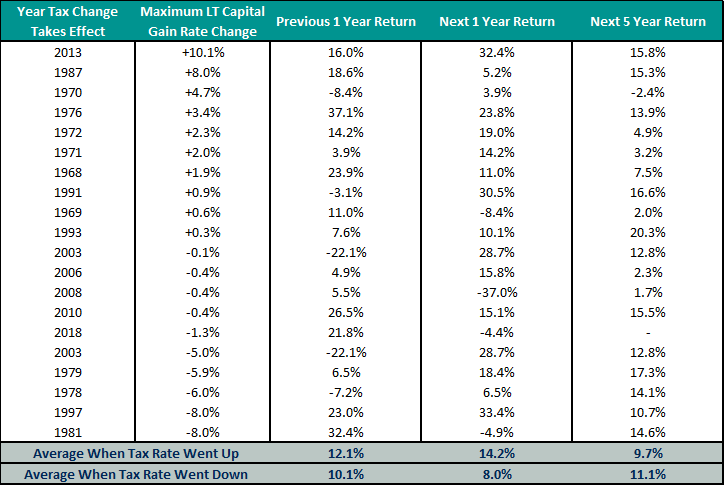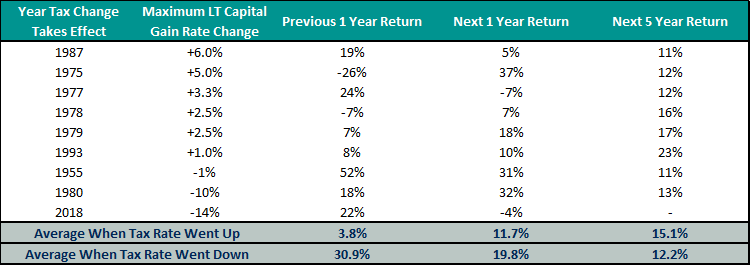Tax Changes and Your Portfolio’s Returns

For those who keep up to date with investment news through traditional media, you have likely heard the theory that a potential increase in the long-term capital gains rate may cause investors to sell all of their positions with unrealized gains ahead of the tax change in the name of avoiding higher future tax rates. As a result, they claim this mass-selling will be detrimental for markets and drive prices lower. At face value this seems like a reasonable theory, but what does historical evidence tell us?
Exhibit 1

In Exhibit 1, we look at S&P 500 returns in the year prior to the tax rate change taking effect, the year the tax rate changes, as well as the return for the five years following the tax rate change. Markets are incredibly efficient at incorporating information into prices. So, the goal of these time horizons is to see what the market did in advance, in real time, and the near future. Interestingly, as news of tax rate changes dripped out, that same year, on average the S&P 500 performed better than in years when the long-term capital gains tax rate decreased. Looking at the longer time horizon, we do see that the S&P 500 generated better returns following tax cuts. While that may follow more traditional logic, it is also important for us to remember this is a very small sample size and that markets were also busy pricing in significant additional information over that period. The enhanced returns are likely not solely due to lower tax rates (if at all).
What if the Corporate Tax Rate Changes?
If tax changes impact individuals with higher incomes, surely there is a multiplier effect when applied to organizations with billions in revenue. Right? Again, in theory, it would make sense that raising taxes would lower returns. After all, the more Uncle Sam takes the less the organization has to reinvest or share with investors through dividends. But “conventional wisdom” did not necessarily fare well with regards to personal tax rates, so we better look to the evidence.
Exhibit 2

Source: Wolters Kluwer, Morningstar Direct. Returns reflect the S&P 500 Index.
Unfortunately, the sample size is even smaller as we look to changes to the corporate tax rate. But the results are just as interesting. In an exact reversal from Exhibit 1, we now see that, on average, S&P 500 returns were better in the year prior and the year when corporate tax rates fell. But also reversing the trend from the previous exhibit, long-term returns have actually been higher (again on average), when corporate tax rates were increased.
So, What Gives?
Combining Exhibit 1 and 2, we have a three-to-three tie regarding tax rate increases or decreases improving S&P 500 returns. Rather than trying to break the tie and risk a political feud, we can turn to the real lesson. It is important for investors to pay attention to tax rates. There are numerous tax planning strategies that only become more valuable as tax rates rise. But trying to time the market isn’t one of them. The market is simply pricing in too many variables too efficiently for one variable, such as a change in tax rates, to create a predictable benefit that rivals sitting on the sidelines or buying into the market as much as either side of the media might like to portend.
